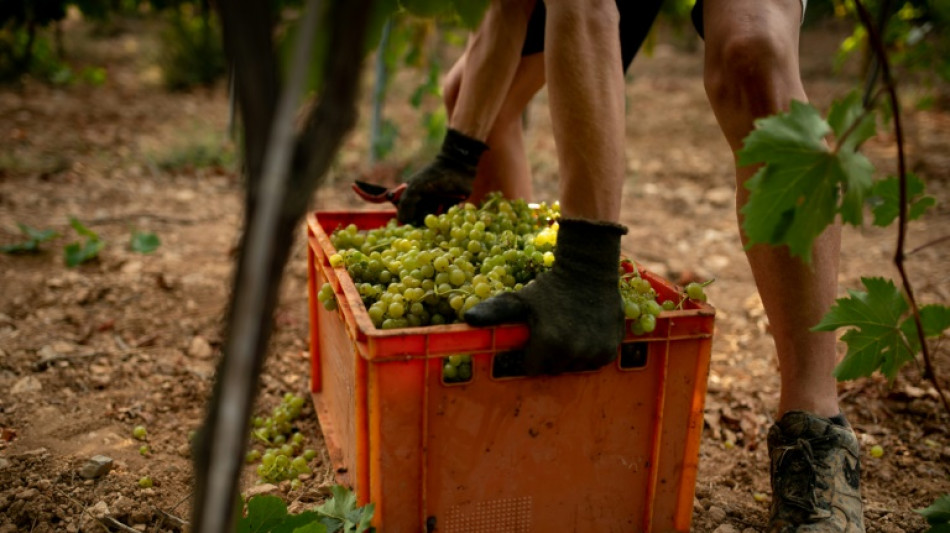
-
 Australian tennis star Purcell provisionally suspended for doping
Australian tennis star Purcell provisionally suspended for doping
-
Asian markets track Wall St rally as US inflation eases rate fears

-
 Luxury Western goods line Russian stores, three years into sanctions
Luxury Western goods line Russian stores, three years into sanctions
-
Wallace and Gromit return with comic warning about AI dystopia

-
 Philippine military says will acquire US Typhon missile system
Philippine military says will acquire US Typhon missile system
-
Afghan bread, the humble centrepiece of every meal

-
 Honda and Nissan expected to begin merger talks
Honda and Nissan expected to begin merger talks
-
'Draconian' Vietnam internet law heightens free speech fears

-
 Israeli women mobilise against ultra-Orthodox military exemptions
Israeli women mobilise against ultra-Orthodox military exemptions
-
Asian markets track Wall St rally as US inflation eases rate worries

-
 Tens of thousands protest in Serbian capital over fatal train station accident
Tens of thousands protest in Serbian capital over fatal train station accident
-
Trump vows to 'stop transgender lunacy' as a top priority

-
 Daniels throws five TDs as Commanders down Eagles, Lions and Vikings win
Daniels throws five TDs as Commanders down Eagles, Lions and Vikings win
-
'Who's next?': Misinformation and online threats after US CEO slaying

-
 Only 12 trucks delivered food, water in North Gaza Governorate since October: Oxfam
Only 12 trucks delivered food, water in North Gaza Governorate since October: Oxfam
-
InterContinental Hotels Group PLC Announces Transaction in Own Shares - December 23

-
 Melrose Group Publicly Files Complaint to the Ontario Securities Commission
Melrose Group Publicly Files Complaint to the Ontario Securities Commission
-
Langers edge Tiger and son Charlie in PNC Championship playoff

-
 Explosive batsman Jacobs gets New Zealand call-up for Sri Lanka series
Explosive batsman Jacobs gets New Zealand call-up for Sri Lanka series
-
Holders PSG edge through on penalties in French Cup

-
 Slovak PM Fico on surprise visit to Kremlin to talk gas deliveries
Slovak PM Fico on surprise visit to Kremlin to talk gas deliveries
-
Daniels throw five TDs as Commanders down Eagles

-
 Atalanta fight back to take top spot in Serie A, Roma hit five
Atalanta fight back to take top spot in Serie A, Roma hit five
-
Mancini admits regrets over leaving Italy for Saudi Arabia

-
 Run machine Ayub shines as Pakistan sweep South Africa
Run machine Ayub shines as Pakistan sweep South Africa
-
Slovak PM Fico on surprise visit to Kremlin

-
 Gaza rescuers say Israeli strikes kill 35
Gaza rescuers say Israeli strikes kill 35
-
'Incredible' Liverpool must stay focused: Slot

-
 Maresca 'absolutely happy' as title-chasing Chelsea drop points in Everton draw
Maresca 'absolutely happy' as title-chasing Chelsea drop points in Everton draw
-
Salah happy wherever career ends after inspiring Liverpool rout

-
 Three and easy as Dortmund move into Bundesliga top six
Three and easy as Dortmund move into Bundesliga top six
-
Liverpool hit Spurs for six, Man Utd embarrassed by Bournemouth

-
 Netanyahu vows to act with 'force, determination' against Yemen's Huthis
Netanyahu vows to act with 'force, determination' against Yemen's Huthis
-
Mbappe back from 'bottom' as Real Madrid down Sevilla

-
 Ali hat-trick helps champions Ahly crush Belouizdad
Ali hat-trick helps champions Ahly crush Belouizdad
-
France kept on tenterhooks over new government

-
 Salah stars as rampant Liverpool hit Spurs for six
Salah stars as rampant Liverpool hit Spurs for six
-
Syria's new leader says all weapons to come under 'state control'

-
 'Sonic 3' zips to top of N.America box office
'Sonic 3' zips to top of N.America box office
-
Rome's Trevi Fountain reopens to limited crowds

-
 Mbappe strikes as Real Madrid down Sevilla
Mbappe strikes as Real Madrid down Sevilla
-
'Nervous' Man Utd humiliated by Bournemouth

-
 Pope again condemns 'cruelty' of Israeli strikes on Gaza
Pope again condemns 'cruelty' of Israeli strikes on Gaza
-
Lonely this Christmas: Vendee skippers in low-key celebrations on high seas

-
 Troubled Man Utd humiliated by Bournemouth
Troubled Man Utd humiliated by Bournemouth
-
2 US pilots shot down over Red Sea in 'friendly fire' incident: military

-
 Man Utd embarrassed by Bournemouth, Chelsea held at Everton
Man Utd embarrassed by Bournemouth, Chelsea held at Everton
-
France awaits fourth government of the year

-
 Germany pledges security inquest into Christmas market attack
Germany pledges security inquest into Christmas market attack
-
Death toll in Brazil bus crash rises to 41


Spain, Portugal dryness 'unprecedented' in 1,200 years
Parts of Portugal and Spain are the driest they have been in a thousand years due to an atmospheric high-pressure system driven by climate change, according to research published Monday, warning of severe implications for wine and olive production.
The Azores High, an area of high pressure that rotates clockwise over parts of the North Atlantic, has a major effect on weather and long-term climate trends in western Europe.
But in a new modelling study published in the journal Nature Geoscience, researchers in the United States found this high-pressure system "has changed dramatically in the past century and that these changes in North Atlantic climate are unprecedented within the past millennium".
Using climate model simulations over the last 1,200 years, the study found that this high-pressure system started to grow to cover a greater area around 200 years ago, as human greenhouse gas pollution began to increase.
It expanded even more dramatically in the 20th century in step with global warming.
The authors then looked at evidence of rainfall levels preserved over hundreds of years in Portuguese stalagmites, and found that as the Azores High has expanded, the winters in the western Mediterranean have become drier.
The study cites projections that the level of precipitation could fall a further 10 to 20 percent by the end of this century, which the authors say would make Iberian agriculture "some of the most vulnerable in Europe".
They warn that the Azores High will continue to expand during the 21st century as greenhouse gas levels rise, leading to an increasing risk of drought on the Iberian Peninsula and threatening key crops.
"Our findings have important implications for projected changes in western Mediterranean hydroclimate throughout the twenty-first century," the authors said.
- Wither vines -
The Azores High acts as a "gatekeeper" for rainfall into Europe, according to the study, with dry air descending in the summer months to cause hot, arid conditions in much of Portugal, Spain and the western Mediterranean.
In the cool, wetter winter period, the high-pressure system swells, sending westerly winds carrying rain inland.
This winter rain is "vital" for both the ecological and economic health of the region, but it has been decreasing, particularly over the second half of the 20th century.
While previous research had not untangled the effects of natural variability on the Azores High, the authors said their findings show its expansion during the industrial era is linked to the rise of atmospheric greenhouse gas concentrations.
A study cited in the latest research estimates that the area suitable for grape growing in the Iberian Peninsula could shrink by at least a quarter and potentially vanish almost completely by 2050 because of severe water shortages.
Meanwhile, researchers have predicted a 30-percent drop in production for olive regions in southern Spain by 2100.
Winemakers are already looking for ways to adapt to the changing climate, such as moving vineyards to higher altitudes and experimenting with more heat-tolerant varieties.
Last year, scientists found that a severe spring frost that ravaged grape vines in France was made more likely by climate change, with the plants budding earlier and therefore more susceptible to damage.
Ch.Kahalev--AMWN



